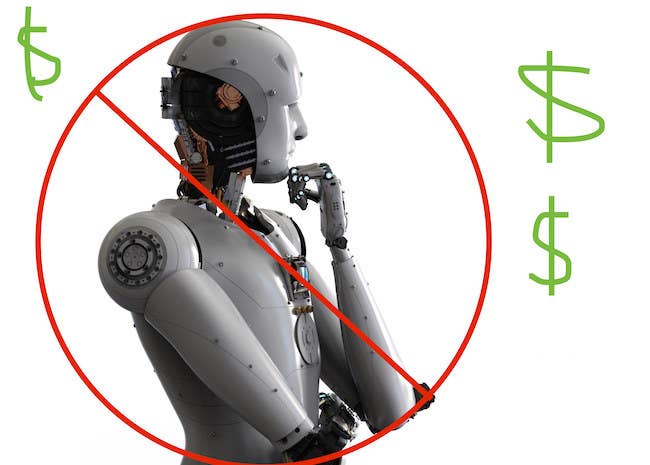
The idea of basic income — in which the government gives all citizens a small monthly stipend — has grown popular in tech circles, not in the least because it's seen as a possible solution to the looming problem of robots, artificial intelligence, and automation taking jobs away from human workers.
But when Stockton, California Mayor Michael Tubbs spoke at Cash Conference, a pro-basic income event held in San Francisco on Thursday, about plans to test a basic income pilot for his city, he said the program isn't a response to encroaching technology.
“Basic income isn't about a scary future where robots run everything,” Tubbs told reporters at a press conference held Thursday. “It’s about today, when working people can't afford rent.”
Tubbs, along with the Economic Security Project — the group that hosted the Cash Conference, which is partially backed by Facebook co-founder Chris Hughes — announced Stockton’s pilot on Wednesday. The Economic Security Project pledged $1 million to the initiative, which will dole out $500 a month per Stockton household. For comparison, other basic income test programs range from one that pays $1,500 a month to 100 families in Oakland, to others in places like Kenya that offer people much lower monthly stipends.
"Basic income isn't about a scary future where robots run everything. It’s about today, when working people can't afford rent."
Many of the pilot program’s details , including how many people will be selected, how long it will run, and how it will select participants, are still undecided. Tubbs said the city is hiring a researcher who will design the pilot over the course of six to nine months.
Basic income pilots are in vogue in places around the world right now; Hawaii’s doing one, Ontario, Canada is doing one, and startup accelerator Y Combinator is doing one in Oakland. The idea is to find out, if you give randomly selected people money with no strings attached, what they will spend it on.
“I think the vast majority of people will make rational economic decisions,” Tubbs said of the not-yet-selected Stockton families who will participate in the basic income pilot.
Not all policy makers think giving Americans a basic universal income is a good idea. Vice President Joe Biden, who recently launched an institute to study jobs and work at the University of Delaware, has opposed the idea, because he believes people derive dignity from doing work.
"While I appreciate concerns from Silicon Valley executives about what their innovations may do to American incomes, I believe they're selling American workers short,” Biden wrote in a blog post.
But Bloomberg venture fund manager Roy Bahat, who moderated a panel at Cash Conference, said it’s wealthy people, not average Americans, who derive self-worth from their jobs. “Work is about meaning...if you make $150k a year,” Bahat said, citing a survey conducted by Bloomberg and the New America foundation. “For everyone else, it's about security.”
Tubbs said receiving basic income wouldn’t necessarily preclude someone from having a job — to be sure, it would be nearly impossible to live on $500 a month alone in California. Tubbs says many of his constituents in Stockton have jobs and work long days, but still can’t afford to pay their bills.
“I would say there is something inherently good about work, but I don’t think the inherent goodness of work is in working and not making money,” Tubbs said Thursday. “I think it’s a false dichotomy to say, we can do this but we can’t do that. I think people have dignity when they can pay their bills, pay their healthcare bills, take their kids shopping.”
Stockton, while just a few hours away from San Francisco, hasn’t really benefited from the tech boom in the Bay Area. Tubbs said he first learned of basic income from Martin Luther King’s book Where Do We Go From Here?, not from Silicon Valley’s roboticists futurists. In the years since he first read King’s book, Tubbs said he’s watched as basic income — or “guaranteed income” in King’s words — has become “not some crazy idea” but a policy proposal a lot of people were thinking about.
For him, the basic income pilot isn’t about a future where workers are replaced by algorithms and robots, but about a present where the hardest working people — he cited migrant workers, service workers, and Uber and Lyft drivers — can’t making a living even if they’re working full-time.
